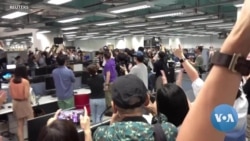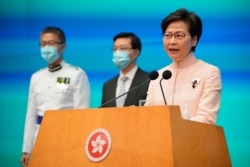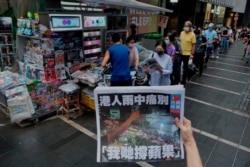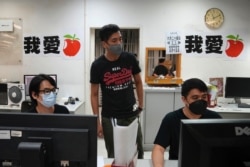With Hong Kong’s last pro-democracy newspaper gone, questions remain about the future of press freedom in the city.
Apple Daily’s publisher said that with founder Jimmy Lai in prison, five executives arrested under the national security law and its financial assets frozen, it was impossible to continue.
The closure was met with international condemnation, including from U.S. President Joe Biden, who said Thursday, “Beijing must stop targeting the independent press.”
But as the million-copy final edition sold out, media analysts said the loss of Hong Kong’s last pro-democracy newspaper could impact the press scene and how journalists approach reporting on some issues.
By Sunday, the impact appeared to be spreading, with the news website Stand News announcing it would temporarily remove some commentary and opinion articles from its website.
Meanwhile, the South China Morning Post and online news outlet Citizen News reported that Apple Daily editorial writer Fung Wai-kong, 57, was arrested Sunday night at the airport on suspicion of foreign collusion to endanger national security.
Hong Kong’s chief executive, Carrie Lam, has said it is a journalist’s responsibility not to break the national security law and denied the Apple Daily case is an attack on media.
"What we are dealing with is neither a news outlet problem nor a news reporting problem. It’s a suspicious act of endangering national security," Lam said at a briefing this past week.
Eric Wishart, the press freedom committee co-convener at the Foreign Correspondents Club of Hong Kong and a journalism lecturer at Hong Kong University, said, “The big question is, when do you cross that line?”
“Can an opinion piece breach the law? [Can] quoting somebody outside of Hong Kong breach the law? This is a big ask for journalists,” he told VOA.
Andrew Powner, managing partner at Haldanes, a Hong Kong law firm that represents international media, said the foreign press has continued to report freely, including criticism of the Hong Kong and Chinese governments.
“It would appear that international media who are merely quoting Western critics or quoting advocates who are calling for sanctions should not fall foul of the (national security law); providing that the content of the article does not attempt to incite others to commit offences under the (law), but falls within the internationally accepted norms of balanced reporting,” Powner said via email.
Until the first judicial interpretation of the security law is reached, “red lines” will not be known in detail, Powner said. He added that allegations and evidence that led to the Apple Daily executives’ arrests are not yet public.
The lawyer said that press freedom is guaranteed under the law and that authorities have said the arrests are an “exceptional case.”
An adviser to Apple Daily’s founder says that Hong Kong’s security bureau alleged the paper violated the law in 30 articles but has not informed the publishers what those were.
A spokesperson for Hong Kong’s security bureau told VOA earlier this week that it will not comment on active legal proceedings but that "endangering national security is a very serious crime."
Two Hong Kong lawmakers told VOA the law is important. It was passed in July last year in reaction to mass anti-government protests in 2019 that often turned violent.
Eunice Yung said there are no exemptions under the legislation, adding that the executives were rightfully arrested. “They need to bear the legal consequences if they breach the national security law,” she said.
Yung said the Apple Daily case is not about freedom of the press, but acknowledged it was hard to draw the line.
"If you merely criticize the law or comment on how strong it is, or what should the law include, or what should be exempted, I think this is allowed and it is totally reasonable," she said. But "if you ask a foreign country to sanction Hong Kong officials, this is another story.”
Lawmaker Holden Chow held a similar view, saying Hong Kong would continue to have freedoms "as long as they don’t go beyond the law."
Keith Richburg, a journalism professor at Hong Kong University, told VOA in May it was “troubling” that media that are critical of the government are being targeted in the city, with “Apple Daily and Stand News probably at the frontlines.”
Stand News was founded in 2014 and describes itself as a pro-democracy news website.
During the protests of 2019, several of its reporters were injured, including journalist-turned-activist Gwyneth Ho. She was one of 47 people accused of subversion under the law in February.
Ronson Chan, the website’s deputy assignment editor, told VOA last week, “After the close of Apple Daily, half of the people in Hong Kong say Stand News will be the next target.”
“I haven’t heard a very clear message we might be searched or our staff will be arrested. From my understanding of the law and the police operation, I don’t think we have a problem with our news reporting," Chan said. He added that Stand News' editorial policy is sticking to its “mindset” and “principles.”
The news website made a similar comment Sunday, when it announced via its website the temporary removal of commentary, op-eds, blogs and reader contributions. The website said that news articles and video would not be affected.
Stand News said that six of its board members have resigned and that the website “continues to operate and its policy and editorial work remain unchanged.”
Chan told VOA Sunday the website was not under government pressure, saying, "All the measurements are made by ourselves.”
Hong Kong’s only public broadcaster, Radio Television Hong Kong (RTHK), has also come under scrutiny in recent months, with its new director of broadcasting axing popular shows for alleged bias. Journalists have been terminated, and Lam was provided her own TV segment, a move criticized as propaganda by critics.
Wider impact
Mark Simon, assistant to Lai at Next Digital — the parent company of Apple Daily — said that clamping down on the media will have a “lasting impact.”
“You cannot have political prisoners, you cannot close down media, you cannot seize private property and be an international finance center; it doesn’t happen,” Simon told VOA last week.
Self-proclaimed as “Asia’s World City,” Hong Kong has had a long-standing reputation as a global financial hub.
But with the scenes of protesters, tear gas and riot police during protests in 2019, that reputation has taken a hit. Add in the national security law last year, and international businesses are considering their options.
Political analyst Joseph Chen, formerly of Hong Kong and now in Australia, cited a recent survey on how changes in the region were affecting the city’s international status.
When the American Chamber of Commerce in Hong Kong, a leading business organization, surveyed its members, 42% indicated they were considering leaving. Among the 300 members who responded, the most widely shared concern was with the national security law.
“Apparently many multinational corporations in Hong Kong are considering downsizing their operations and expanding their operations in other cities in Asia, like Singapore and Tokyo,” Chen said. “I think these trends will hurt Hong Kong’s economy in the foreseeable future.”
The security law has certainly affected Apple Daily. The paper is out of print after 26 years, and two of the five executives have been denied bail. A hearing is scheduled for August 13.
Some information for this report came from the Associated Press.









